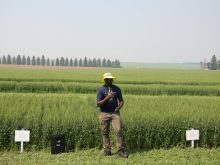WINNIPEG — Genesis Fertilizers wants to move 300,000 tonnes of phosphate fertilizer per year through the Port of Churchill.
That’s not going to happen this year, or in 2026, but if everything falls into place, the Saskatoon company is hoping those shipments will begin in several years.
Related story: Companies plan to mine phosphate in Quebec, Ontario
Read Also

New coal mine proposal met with old concerns
A smaller version of the previously rejected Grassy Mountain coal mine project in Crowsnest Pass is back on the table, and the Livingstone Landowners Group continues to voice concerns about the environmental risks.
The firm is raising funds to build a nitrogen fertilizer plant in Belle Plain, Sask., and fertilizer distribution centres across the Prairies.
“Our plan is to produce about a million tonnes per year of nitrogen, between urea and urea ammonium sulfate (UAS),” said Jason Mann, president and chief executive of Genesis.
“We need about 300,000 tonnes of phosphate to accompany that…. We will be looking for that supply to marry up to our nitrogen production.”
Canada imports almost 100 per cent of its phosphorus fertilizer, primarily from phosphate rock mines in Florida, North Carolina and other states.
Depending on one country to supply a critical nutrient is not a great idea, especially now, given that U.S. president Donald Trump wants to re-structure global trade in favour of the United States.
Mann studied a range of possible routes and ports for importing phosphate and concluded that Churchill makes the most sense.
A vessel loaded in Morocco, a major producer of phosphate, could sail directly to the Port of Churchill and unload.
“We can do 30,000 tonne vessels into Churchill…. The port is open from July through November,” Mann said.
“We would want to have enough infrastructure at Churchill to bring those 300,000 tonnes in (say) September to November.”
The needed infrastructure for unloading, storage and transferring fertilizer onto rail cars isn’t in place yet in Churchill.
To make that happen, Genesis has signed a letter of intent with Arctic Gateway Group (AGG) , which owns the port and the Hudson Bay rail line from Churchill to The Pas, Man.
“This collaboration with Genesis Fertilizers speaks to the value AGG can provide to Western Canada’s agricultural and resource industries, which we need more than ever given trade uncertainty with the United States,” said Chris Avery, AGG’s chief executive officer.
Mann has experience with moving fertilizer via Churchill.
In 2007 he was the chief executive of AgraCity, which purchased Russian fertilizer and shipped it through the Port of Churchill. Farmers of North America then sold the fertilizer to Canadian farmers.
“The infrastructure in Churchill didn’t support it very well, but we got the job done,” Mann said.
Investments and upgrades will be needed before Churchill can handle regular shipments of fertilizer.
Sections of the rail line from Churchill to The Pas are built on muskeg and permafrost, which has caused problems since the line opened in 1929.
Those issues have never been fully resolved, but Mann is confident in Arctic Gateway.
The group has invested, with the support of taxpayers, tens of millions into the railway and rail bed.
“What we’ve seen since they’ve taken ownershi p… they’ve repaired that rail line a lot. As I understand it, they’ve improved transit times by over 10 per cent.”
As for the port, the shipping season has historically been three to four months – from July until November.
That’s enough time to accept fertilizer shipments, but Mann believes the shipping season will get longer.
“I think it’s going to get close to six months.”
Contact robert.arnason@producer.com


















